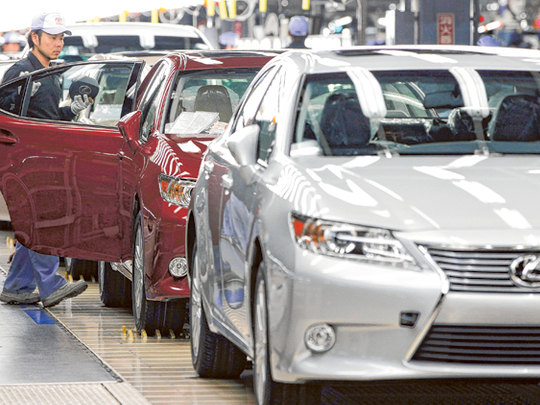
Tokyo: Japan’s economy expanded in the second quarter at half the pace the government initially estimated, underscoring the risk of a contraction as Europe’s debt crisis caps exports.
Gross domestic product grew an annualised 0.7 per cent in the three months through June, the Cabinet Office said in Tokyo on Monday, less than a preliminary calculation of 1.4 per cent. The median forecast of 26 economists surveyed by Bloomberg News was for a revised 1 per cent gain. In nominal terms, the economy shrank 1 per cent.
Gridlock in parliament may limit fiscal stimulus just as Japan’s expansion is restrained by weakness in global demand, strength in the yen and the winding down of car-purchase subsidies. A slowdown in Asia may further curtail exports and add to pressure for monetary easing after Chinese data yesterday suggested the region’s biggest economy is losing steam.
“The economy has been losing momentum this quarter, with exports likely to decrease while consumption and capital spending are deteriorating,” said Kiichi Murashima, chief economist at Citigroup Global Markets Japan Inc. “The chance that the Japanese economy will slip into a contraction in the third quarter is increasing.”
The Nikkei 225 Stock Average fell 0.1 per cent to 8,860.34 at the 11.30am trading break in Tokyo after a 2.2 per cent surge on September 7.
Economic contraction
The economy contracted an annualised 1 per cent in nominal terms in the second quarter, compared with a 5.5 per cent increase in the January-to-March period.
The current-account surplus fell 41 per cent from a year earlier to 625.4 billion yen (Dh29.3 billion or $8 billion) in July, a finance ministry report showed. The surplus in the widest measure of trade compared with economists’ 485.6 billion yen median estimate. The July number was the smallest for that month since 1996 as nuclear-reactor shutdowns after last year’s earthquake and tsunami drive up energy imports, data compiled by Bloomberg shows.
Already saddled with the world’s largest public debt burden, Prime Minister Yoshihiko Noda and his government may run out of money as soon as December as lawmakers block legislation for deficit-financing bonds, finance ministry forecasts show. Noda’s opponents aim to force an early election.
Industrial production has cooled and manufacturers such as Toyota Motor Corp will be hit by the end of government handouts for purchases of energy-efficient cars. Currency gains may weigh on exporters, with the yen up about 7 per cent against the dollar since mid-March, trading at 78.24 as of 12.13pm in Tokyo.
“Europe’s debt crisis and the yen’s strength restrained companies from spending in the second quarter,” said Takashi Shiono, an economist at Credit Suisse Group AG in Tokyo. “Japan’s economy will probably contract in the third quarter as the boost from the government’s car subsidy program wanes and the downward pressure from weak external demand materialises.”
While a European Central Bank plan to buy bonds and China’s approvals of projects for building roads and subways spurred global gains in equities last week, data released yesterday showed that Chinese industrial output rose the least in three years in August.
In Japan, the central bank is set to review monetary policy on September 18 and 19 and may add to easing by October at the latest, according to Citigroup Inc. In the revised figures for the second-quarter economy, the government reduced its estimate of private companies’ inventories of raw materials.











